We have accumulated images of all the known oil paintings of Francis Quirk that we have been able to locate and placed them into a slideshare presentation. (The University of Notre Dame Snite Museum does not allow reproductions of their works to be shared. Thus their holding is not included.)
We know that there are many other works out there as a profile in the Lehigh University Alumni Magazine from 1951 mentions that he executed 6 canvases and over a dozen portraits in the previous year. You can visit the Image Library Presentation through this link.
Wednesday, January 4, 2017
Sunday, January 1, 2017
Nautical or Maritime Watercolor Paintings by Francis Quirk
We had a rather extensive backlog of images of Francis J. Quirk's watercolors that we had not shared. These images come from works that were auctioned in Maine in September of 2016.
The watercolors vary in subject matter and style. The first two of Mary in the boatyard contain considerable detail.Others are less detailed with one executed in a cubist style. They were probably executed during his summers at Peterspen North, his home in the Kinney Shores area of Saco, Maine.
The painting with the boat passing the lighthouse appears to have similar coast to an oil painting that was recently auctioned in Maine.
The final image is of a pencil sketch of a yacht race that he only began to fill in with paint. We included it as it showed his working method.
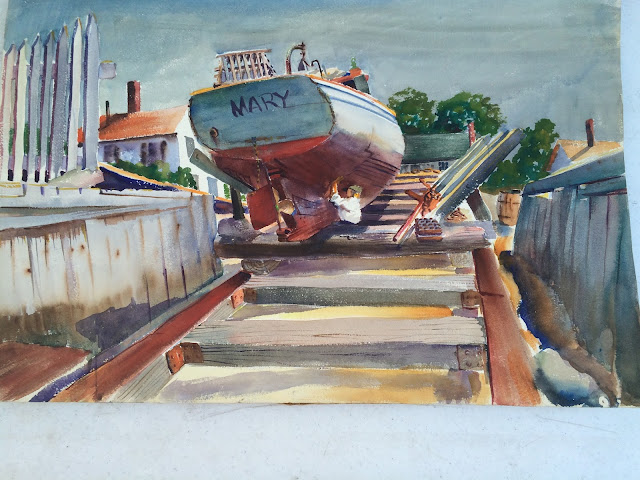 |
| Scraping the Lobste Boat Mary Maine Watercolor by Francis Quirk |
 |
| Lobsterboat Maintenance Watercolor by Francis Quirk |
 |
| Maritime Watercolor by Francis Quirk |
 |
| Maritime Watercolor by Francis Quirk |
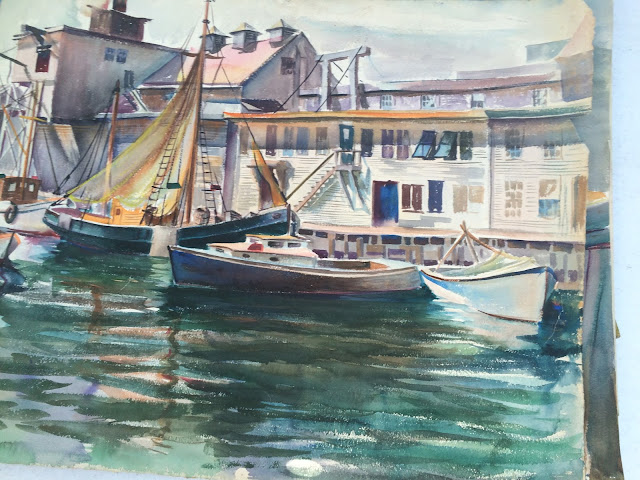 |
| Maritime Watercolor by Francis Quirk |
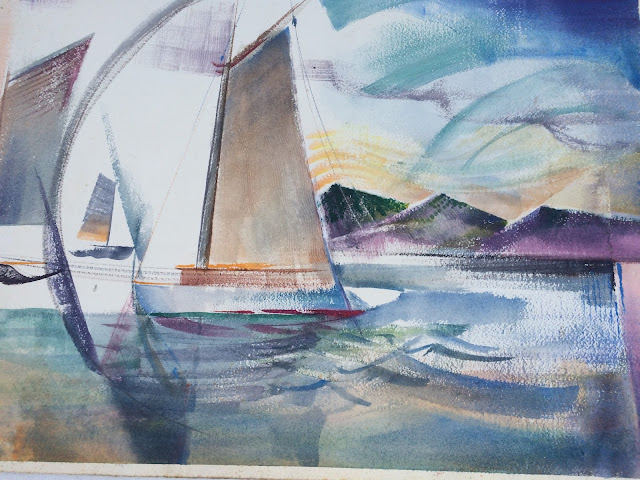 |
| Sailboat Watercolor Painting by Francis J. Quirk |
 |
| Maritime Watercolor by Francis Quirk |
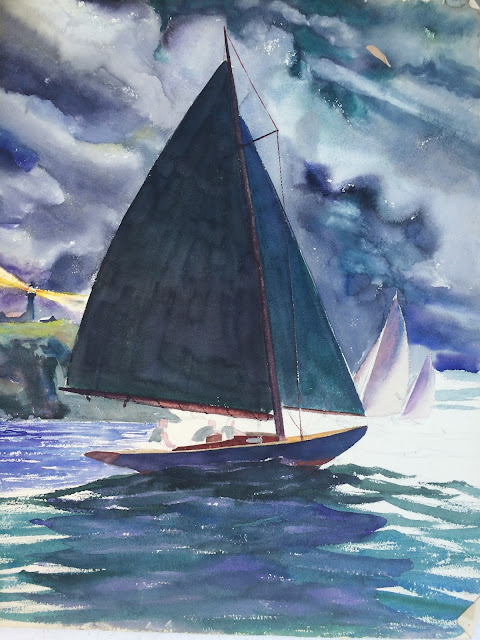 |
| Maritime Watercolor by Francis Quirk |
 |
| Maritime Watercolor by Francis Quirk |
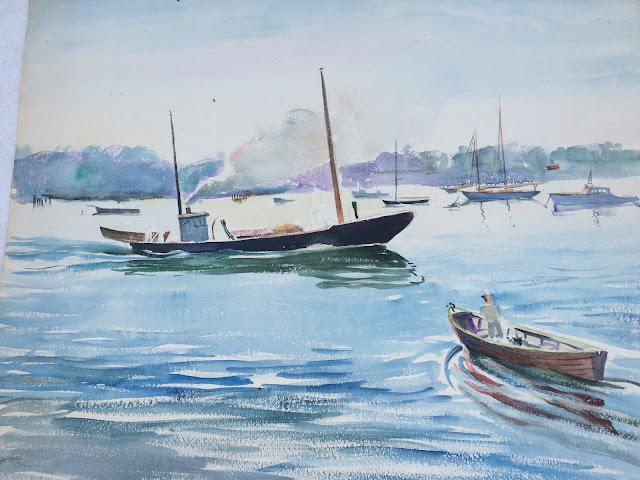 |
| Maritime Watercolor by Francis Quirk |
 |
| Pencil Sketch of Incomplete Sailboat Race Watercolor by Francis Quirk |
Friday, December 23, 2016
Twenty Five Year Old Francis Quirk Honored With Tiffany Foundation Fellowship in 1932
The
biographies of Francis Quirk list him as having had a Tiffany Foundation
Fellowship, but we wondered ‘what did this mean exactly?’ As we looked into it
we were more and more impressed with this accomplishment.
After some hunting, we learned that some of
the Foundation’s papers were at the Archives of American Art near the National Portrait
Gallery in Washington. When we visited the facility a lovely young woman,
Meghan from West Virginia was extremely helpful in providing the microfilm and
teaching how to use the machine. Even with her expert guidance, the process of
scrolling through the microfilm was headache inducing, but ultimately well
worth the effort.
 |
| Louis Comfort Tiffany- Creator of the Foundation |
The famous glassmaker and pioneer in decorative arts, Louis Comfort Tiffany established the Tiffany Foundation in 1919. The idea behind it was that
it would help young artisans of talent by giving them the opportunity to hone
their craft at his 80 acre estate Laurelton Hall in Cold Spring Harbor, New
York. In 1932 he would add a gallery at 65 -67 East 56th Street in
New York City to display and sell their works. The combination would hopefully
accelerate their careers.
 |
| Concord Minuteman Statue by Daniel Chester French |
 |
| Abraham Lincoln Sculpture by Daniel Chester French |
The Fellowships
were open only to men older than 20 and younger than 30. These talented
artisans were selected from a pool of hundreds of applicants by a panel of
experts that included luminaries such as Daniel Chester French who sculpted sitting Abe in the Lincoln Memorial and impressionist painter Childe Hassam.
 |
| Rainy Day Boston by Childe Hassam Toledo Museum of Art |
Fellows were admitted in two groups of five who were at Laurelton for a 3 month
periods; either May to July or August through October. They were provided with
meals and had full access to the facilities including the tennis, bowling and
squash court. There were restrictions on what they could paint or sculpt in
that they were to focus on “landscape and decorative composition” as Tiffany
felt they could learn more in this fashion “than by working from the human
figure.”
In scrolling
through the documents there were numerous pages of minutes from Board meetings.
Interestingly, during the intervening century the nature of minutes has not
changed that much. They were strikingly similar to the minutes of companies and
non-profits that I am involved with today. One fascinating aside was the
companies that the foundation was invested in- they included the Atchinson,
Topeka and Santa Fe Railroad and American Tobacco.
But the
minutes contained no references to our man Francis Quirk. But then eventually
we came to pamphlets about the program and they listed the awardees. After
looking through about 10 of the pamphlets- Eureka! There was Francis J. Quirk
on the Fellows list in 1932. He would have been 25 years old and on his way!
Beyond that mention, we found no other references to the Mid-Century Master.
The research
made one thing clear- that Francis Quirk had received a significant honor in
winning the Tiffany Fellowship. The reviewers look at thousands of paintings
from hundreds of candidates each year.
There was
one additional find in the microfilm in a document that was marked “Confidential”
It appears that the Tiffany Foundation was contracted in World War 2 to develop
Camouflage technology. The contract ran from 1942-1948.
You can
learn more about the Louis Comfort Tiffany Foundation here. You also can see many items from
Laurelton Hall at the wonderful Morse Museum in Winter Park, Florida.
Thursday, December 22, 2016
Portrait of Woman in Turquoise by Francis J. Quirk Emerges in Chula Vista California
There has been a striking amount of activity around the work of Francis Quirk in the last few months. We do not know the reason for it, but it certainly is keeping this blog busy.
The beautiful portrait below is for sale through EBay from a firm in Chula Vista, California. The oil on canvas measures 30"x25" and is signed Francis J. Quirk in a script signature and dated 1944. He would have been 37 at the time it was painted.
The woman is impeccably groomed in an aqua dress, sitting in a yellow upholstered chair with a vase full of beautiful peonies blooming beside her. This portrait is one of softer tones with the pale blue background and a lavender tint to the peonies. There is nothing jarring or popping at the eye.
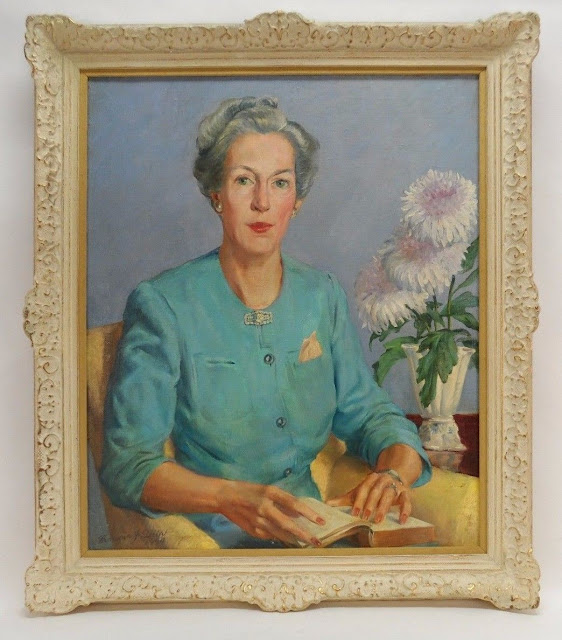 |
| Woman in Turquoise by Francis J. Quirk 1944 |
This woman is no shrinking violet. She is firmly holding our gaze with those bright green eyes. But, let us examine some of the wonderful details that show she is a woman of some means. Look at the jewelry. The pearl earrings are sizable. There is a significant diamond broach at her conservative neckline. Yet, there is even more.
 |
| Woman in Turquoise by Francis J. Quirk 1944 |
On her left and there is a substantial diamond on her ring finger along with a watch. Hidden in the shadows of the right hand appears to be a significant emerald on the smallest finger. And of course the nails are beautifully manicured. Not only are they painted red, but also they glisten and shine, like the blood in Eakins Gross Clinic. Those nails also match the lipstick perfectly.
The color also tells us something about the woman sitting for the portrait. She chose red. Not pink. Not plain, Not clear. But bright red.
Yet there is one more significant detail in the book. If you look closely at the finish of the pages it is in the color gold. This is no cheap paperback she is reading. Nor is it a nice hardcover novel. She is reading a book that was prepared to be seen on a bookshelf in a library; bound and finished so that it denotes quality.
 |
| Close up of hands of portrait in Woman in Turquoise by Francis J. Quirk 1944 |
The close up below shows one of the subtle but attractive elements of this painting in the reflection of the vase in the table's wood surface. Even though it is a decorative element, it gets the full attention of the painter. The painting of the leaves is exquisite as well.
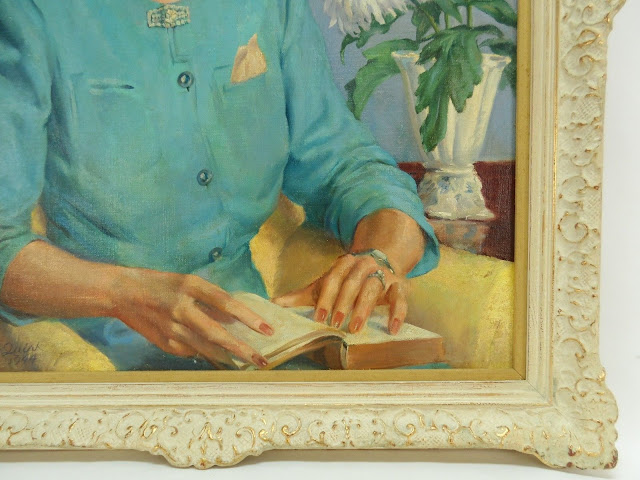 |
| Close up of lower left hand corner of portrait in Woman in Turquoise by Francis J. Quirk 1944 |
We end with one more image. The signature of Francis J. Quirk executed in script with the date 1944. He too is not shy about his signature signing in a bold blue script that blends with the colors of the painting.
 |
| Signature of Francis J. Quirk 1944 |
Tuesday, December 20, 2016
Francis Quirk Maritime Oil Painting and Seaside Family to be Auctioned January 1
Two Quirk paintings will find lucky new owners on January 1, at Robert L. Fosters Auction House in Newcastle Maine. In scrolling through the on-line images there is an eclectic mix of paintings of interest. Coastal Maine was once a major summer getaway for artists and the legacies of that annual migration remain as inventory for auctioneers to resell in estate sales and a vibrant arts community today.
The fist painting is an oil on board measuring 23 ½”x17 ½" of a three masted schooner sailing past a dramatic coast. We have not examined this painting in person.
The painting certainly is dramatic with the use of a dark blue pallet and the reflection of moonlight on the water. The sails have some wind in them, but several are still furled. Perhaps the captain is sailing slowly and more carefully to avoid the rocky hazards that are all along the Maine Seaboard. It appears that the ship is paying respect to the foreboding granite shore.
 |
| Three Masted Schooner by Francis J. Quirk |
We have a number of other maritime watercolor images in our archive which will eventually work there way into blog posts. We have also previously posted images of ships in the Lehigh University Collection, Link 1, Link 2) a water color of a battleship, and an oil of a ship under sail.
The second painting is an oil on canvas of a family at the shore measuring 30”x25”. It contains five figures on a rocky outcrop with three standing with bent fishing rods and two sitting in the foreground. In the background is the spray from a crashing wave and a cloudy sky with patches of light blue poking through. There is a hint of green coastline in the background and we suspect that this may be Kinney Shores in Saco where Quirk maintained a Summer Home he called 'Peterspen North.'
 |
| Oil Painting of a Family at the Shore by Francis J. Quirk |
There is an interesting contrast among the figures as the standing fishers are taught and straining against there rods. The viewers eye is naturally drawn to the boy in the red overalls in the center and then moves through each standing figure in turn. After working standing bodies it then travels along the rod and down the line. But alas we cannot see the excitement on the other end. The feeling of activity is heightened by the wave action.
On the other hand. the sitters are calmly focused on a rod and taking in the scene. They are in a different placid world. Perhaps they are a couple pondering other things or enjoying a quiet moment while others are caught up in a storm of activity.
Like many of Quirk's paintings with people he has been aware of the importance of color and dressed the figures in a variety to add visual interest. It is not as finished as some Quirk paintings.
We also have another image of the painting we had obtained from other sources earlier that does not have the label. In that view, one can see how the rocky coast adds another element.
 |
| Painting of Figures at the Shore by Francis Quirk |
Friday, December 16, 2016
Three Quirk Watercolors Coming up For Auction
Through our friend Richard, we have become aware of three Francis Quirk watercolors coming up for auction. Two are signed and dated 1965. All of them contain numerous figures engaged in sporting activities. The first has figures active at the shore theme, the second a general sports theme and the final has a sports figures in white theme. (Clicking on the links will take you to the auction page.)
 |
| Watercolor of figures at the shore by Francis J. Quirk |
 |
| Watercolor of Sporting Figures signed by Francis J. Quirk 1965 |
 |
| Watercolor of Sporting Figures in White signed by Francis J. Quirk 1965 |
This brings up the question as to the purpose of the works. He put considerable effort into getting the figures right and the background effects. They are more than just extensive collections of figure studies. Could they have been produced for illustrative purposes? Or was this produced for commercial sale? Professor Quirk had homes in Prescott, Arizona, Saco, Maine as well as Bethlehem, Pennsylvania. Selling art would have been helpful to support this real estate empire and raising two children.
Monday, December 12, 2016
Quirk Paintings of the Newspaper Business
Among the many types and styles of work, we were intrigued by some Newspaper related works by Francis Quirk. The first two watercolors appear to be of the same man- an Editor or publisher of a paper. The oil painting of the young man typing recently was offered for auction on line and that spurred us to moving forward with this post.
 |
| Francis J. Quirk Watercolor of a man in the Newspaper trade. |
The painting above has some interesting subtle features. Note the window with the birch trees and reflection of the man. The desk is littered with papers, cokes and a thermos (of coffee?) His tie is down and his sleeves are rolled up. With two phones, this is a man with an active day.
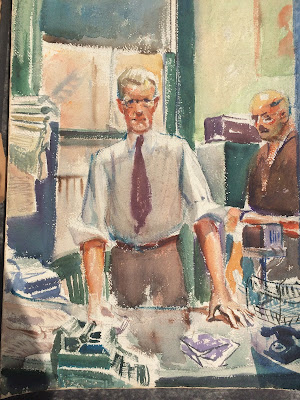 |
| Francis J. Quirk Watercolor of a man in the Newspaper trade. |
This watercolor of the man standing is showing him in a commanding presence. The man in the background is almost in a deferential pose. The tools of his craft are prominently displayed- the black rotary phone, typewriter and in-out baskets. There is no email here!
 |
| Francis J. Quirk Oil painting of a man at a typewriter (possibly in the Newspaper trade.) |
This painting recently came up for auction and we have included it in the Newspaper post.
Subscribe to:
Comments (Atom)
